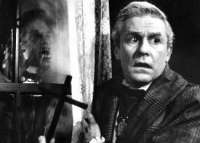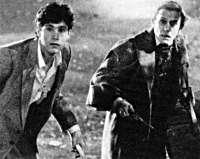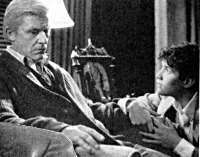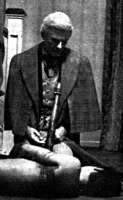Film Review by
Scott Ross
Revised Version of a Critique Written for
THE MIDDLEBURY COLLEGE, October 1985
Copyright 1985, 1996 by Scott Ross
 The title conjures up a number of images, none of them especially promising. Not another slasher film, please god! But, being an unofficial lifetime member of any Roddy McDowall appreciation society that might be out there, I considered it my duty to give the movie at least a cursory glance. I've given it more than that, twice now, and even at a second viewing
"Fright Night" remains one of the most enjoyable experiences I've had at the movies since Steven Spielburg scared the bejeezus out of me with "Poltergeist".
The title conjures up a number of images, none of them especially promising. Not another slasher film, please god! But, being an unofficial lifetime member of any Roddy McDowall appreciation society that might be out there, I considered it my duty to give the movie at least a cursory glance. I've given it more than that, twice now, and even at a second viewing
"Fright Night" remains one of the most enjoyable experiences I've had at the movies since Steven Spielburg scared the bejeezus out of me with "Poltergeist".
...Holland doesn't tamper with the time-honored traditions of vampire lore...
There's some elemental quality in the horror genre that generations of movie-goers have tapped into, time and again. Without going into the complex psychology of the attraction, there is something about the horrific that touches some chord in people - a deeply rooted and seldom-explored chamber of the darker parts of our souls that filmmakers learned how to exploit very early on. This is something that Tom Holland, the writer-director of "Fright Night" understands well, and he's served up two terrific hours of it in this witty exercise in genre-bending.
The horror film has never been a particularly reputable genre, and its glories have been rare. The macabre sensibilities of James Whale gave rise to the two undisputed classics in the field, "Frankenstein" and "Bride of Frankenstein", but that was in the early 1930s. (Tod Browning's 1931 "Dracula" is a terrible movie, and a reminder that - inexplicably - no Dracula film has ever used Bram Stoker's superb novel as a basis.)
The work of his successors - mostly hacks - have served to make Whale's contributions seem Tolstoyan in comparison. And in some strange fashion, the occasional stylistic successes (like "The Haunting of Hill House" and "The Legend of Hell House") are as frustrating as they are satisfying; they merely whet our appetites for elegant trash, but they're essentially self-contained. The haitus between events worthy of notice becomes more protracted, the disappointments more discouraging. I imagine the same holds true for "Fright Night".

The film concerns a high school student (William Ragsdale) who discovers he's living next door to a vampire (played with a delicious mix of charm and menace by Chris Sarandon). That's it really, but one of the wonders of the movie is that it plays fair by the conventions. Even if he occasionally goes for the obvious effect, Holland doesn't tamper with the time-honored traditions of vampire lore. The film's surprise ending may seem like both a cheap shot and a break with tradition, but it's neither. It's simply the logical conclusion to an action whose elements are presented to the initiated as a given.
There is a remarkable respect for the rudiments of gothic horror unities here; even as it pokes sly fun at faustian nonsense, "Fright Night" pushes all the right buttons and pulls all the correct switches associated with our cherished ideas of how a good vampire tale is supposed to affect the viewer.
But the film's most important component lies in the casting of Roddy McDowall. As Peter Vincent, "the Great Vampire Killer" - host of a silly, third-rate TV chiller theatre called "Fright Night", McDowall serves as a cunning reminder that what we're watching is make-believe. Through the juxtapositions of the movie's rising action with Vincent's repeated appearances on the tube nonchalantly dispatching Hollywood vampires, Holland is winking at us even as he's piling on the more horrific trappings of his OWN "Fright Night". Peter Vincent is the joke within the joke.
Nor is McDowall's casting accidental; he's shown up on enough horror-tinged "Twilight Zone" and "Night Gallery" episodes, TV movies and theatrical releases to have become a part of the genre himself. His performance both validates the form and pokes mischievous fun at it.
 Although it's a joy to watch McDowall ham it up as Peter Vincent, glorying in his own essential hokiness, you become aware as the film rolls on of the actor's mastery of craft. His performance seems deliciously camp at first, as he struts about in pompous fashion - until he realizes that, for the first time in his synthetic life and career, he's dealing with a real vampire. At the same time, McDowall is artfully etching a portrait of abject failure - a pathetic shill who knows in his bones that his time is up, a time he never really had to begin with.
Although it's a joy to watch McDowall ham it up as Peter Vincent, glorying in his own essential hokiness, you become aware as the film rolls on of the actor's mastery of craft. His performance seems deliciously camp at first, as he struts about in pompous fashion - until he realizes that, for the first time in his synthetic life and career, he's dealing with a real vampire. At the same time, McDowall is artfully etching a portrait of abject failure - a pathetic shill who knows in his bones that his time is up, a time he never really had to begin with.

When these disparate strands crystallize, Vincent's veneer cracks; he becomes correspondingly more terrified, and we get the movie's only taste of non-surface acting. He's a charlatan, this Peter Vincent - broken-down and seedy, with his actorish posturings and calculated authoratiative timbre, but as McDowall plays him, the character has a conscience. Watch him as he wrestles with his own terror and you become cognizant of this shallow figure's real depth.
There is a long sequence late in the film, as Vincent stands mute witness to the (seeming) death-throes of a demon that is positively moving because of the unspoken pity McDowall evinces. I'm not certain all of the emotions that play across his weathered, oddly beautiful features were written into the script per se, and I doubt they could be. But McDowall gives them to us, subtly and movingly, through his own unassailable artistry - the sheen of craft that resonates throughout his performance.
Despite the cleverness of the movie's admittedly double-edged title, it has a point of view. When Vincent's stint as a late-show host comes to an ends, he laments the taste of the horror-viewing public: "Nobody wants to see vampires any more. What they want are demented madmen running around in ski-masks, hacking up young virgins." This seems to me a key speech, for even as we're being royally entertained, Holland reminds us that his movie is something of a dead-end. He's reminding us that it's all a sham. Even as Richard Endlund's often brilliant special effects are conjuring up images straight from medieval concepts of Hell, the movie is itself almost funeral: a final specimen of a dying species.
Whichever way you care to view it, "Fright Night" is quite a valedictory.